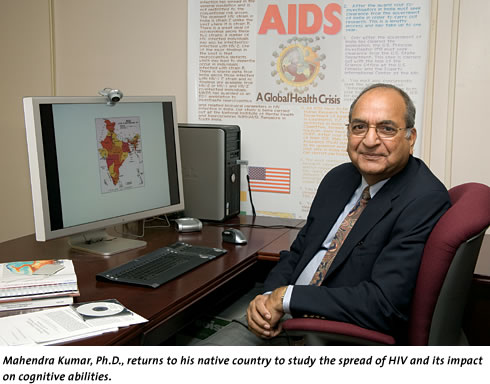Kumar Leads Miller School’s HIV-Related Efforts in India
![]() or the better
part of 20 years, research conducted by Mahendra Kumar, Ph.D., professor
of psychiatry and behavioral sciences at the Miller School, has married
his passion for his native India with his focus on solving the many unanswered
questions surrounding the spread of HIV and the impact of the disease
on the cognitive abilities of those who’ve contracted it.
or the better
part of 20 years, research conducted by Mahendra Kumar, Ph.D., professor
of psychiatry and behavioral sciences at the Miller School, has married
his passion for his native India with his focus on solving the many unanswered
questions surrounding the spread of HIV and the impact of the disease
on the cognitive abilities of those who’ve contracted it.

HIV is a growing epidemic in India, where Kumar says the disease currently affects about three million people, and HIV prevalence is on the rise in 20 of the country’s 28 states.
The recent creation of the U.S./Indo Joint Working Group on Prevention of Sexually Transmitted Diseases and HIV/AIDS, established by the National Institutes of Health’s Office of AIDS Research and the Indian Council of Medical Research and the Department of Biotechnology, will bolster Kumar’s efforts in the region.
In recognition of his prominence in the field, Kumar was asked to co-chair the joint working group’s first project, a four-day conference that brought together 50 top Indian and U.S. clinical researchers, behavioral/social scientists, program managers, and service providers to discuss the prevention and treatment of HIV comorbidities and examine social and cultural factors and co-existing conditions linked to HIV.
“To maintain economic growth in India and Southeast Asia, urgent steps are needed to follow up on work already being done,” says Kumar. As efforts in India increase through the joint working group, Kumar’s priorities include collecting normative cognitive data in India to use as a baseline for comparisons when assessing the neurological effects of HIV.
Kumar also hopes to help increase the Miller School’s presence in India through the development of centers of excellence for HIV study and establishment of a formal training program there.
“We can’t solve the health problems of other
countries, but we can show them how to do it,” he says.